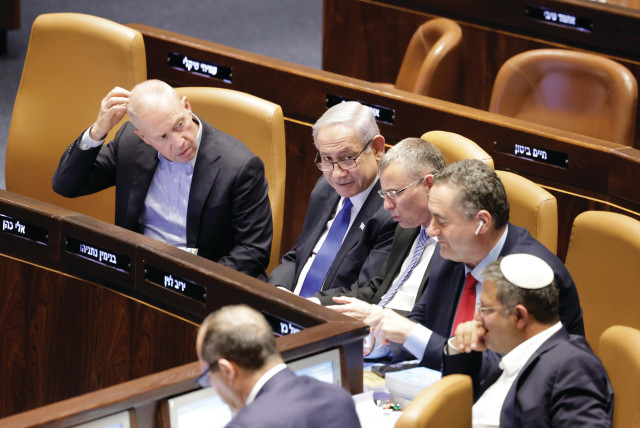The people of Israel deserve a better government - opinion

When a country does not have the government it deserves, what does it do? Its people get more involved. They act. They organize.
The quote, “Every country has the government it deserves,” has been attributed to various people, including Alexander Hamilton, Joseph de Maistre, and Alexis de Tocqueville. Whoever said it was wrong when it comes to Israel, however. Israelis are much better than their government.
From the very first hour of that terrible day, October 7, the people of Israel demonstrated, and continue to demonstrate, their superiority to their government and its institutions. While official Israel was paralyzed and confused, civil society organized and responded.
In those first horrible days and weeks, ordinary Israelis stepped up to rescue and feed, comfort and clothe, transport, embrace, and support wherever possible. In a remarkably short time, help was organized in every corner of society, regardless of political persuasion or religious orientation, including the ultra-Orthodox and Arab communities.
There was unity in Israel, everyone wanted to help: make sandwiches, sort clothing, send a Shabbat meal to the family of a reservist.
Donate, donate, donate. Prof. Michal Almog-Bar of the Institute for the Study of Civil Society and Philanthropy in Israel at Hebrew University, counted 1,000 new civil initiatives in the first two weeks of the war alone, ranging from direct services, such as providing food for soldiers and evacuees, to psychological treatment for the traumatized.
Israeli volunteers were not alone. Civil society assistance even crossed borders. International volunteers, Jewish and gentile, served alongside Israelis to help salvage Israeli agriculture in the war zone. According to a study by Leket Israel released last week, the work of volunteers has saved produce valued at $50 million, since the start of the war.
Although not every individual can sustain the same initial levels of volunteering, time has not dampened the dedication of Israel’s civil society as a whole. We will not follow Knesset’s example in taking a three-month vacation this summer.
The challenges we face are too great, the tasks too urgent. As the months go by, volunteerism continues at an incredibly high level, with increasing sophistication.
The government's neglect
WITH A vision that transcends the immediate moment, some organizations are working to build a broad enough political base to move our political system away from empowering extremes and toward encouraging broad consensus. Israel’s civil society is set to continue to provide what the government has neglected or postponed.
According to a Channel 12 report, survivors of the Hamas terror group’s October 7 massacre are organizing a civil investigative committee to probe the government’s failures on the day of the attack.
The panel of inquiry will be comprised of former senior officials in the defense and judiciary establishments, former mayors of northern and southern communities, and a former top police officer. They are reportedly planning to publish their findings in October 2024, the first anniversary of the tragic massacre.
The best volunteer projects are ennobled by finding common ground that fuels cooperation. Rachel Goldberg-Polin and John Polin, whose son Hersh is a Hamas captive, organized a week of goodness in July to honor all the hostages in Gaza by adding “kindness, good deeds, and generosity into the world.”
The self-organized hostage families have been working every angle, political, media, and international, to help free their loved ones kidnapped on October 7. Winning their freedom is, understandably, a compelling need. It is the families’ most important concern, and all-consuming.
Nevertheless, they demonstrated strength and wisdom by stretching themselves beyond their personal heartbreak and creating the Week of Goodness project. The project affirmed the importance of focusing inward to nourish oneself and one’s community deeply, at moral, ethical, and spiritual levels.
Maintaining our moral compass, our highest values, and our ties to one another are essential for the country to continue at this difficult time. That is civil society’s most profound message.
When a country does not have the government it deserves, what does it do? Its people get more involved. They act. They organize.
Then they vote for a new government, worthy of its citizens.
The writer is a psychologist, radio and television commentator, and host of the Van Leer Series on Ideas.
Jerusalem Post Store
`; document.getElementById("linkPremium").innerHTML = cont; var divWithLink = document.getElementById("premium-link"); if (divWithLink !== null && divWithLink !== 'undefined') { divWithLink.style.border = "solid 1px #cb0f3e"; divWithLink.style.textAlign = "center"; divWithLink.style.marginBottom = "15px"; divWithLink.style.marginTop = "15px"; divWithLink.style.width = "100%"; divWithLink.style.backgroundColor = "#122952"; divWithLink.style.color = "#ffffff"; divWithLink.style.lineHeight = "1.5"; } } (function (v, i) { });

